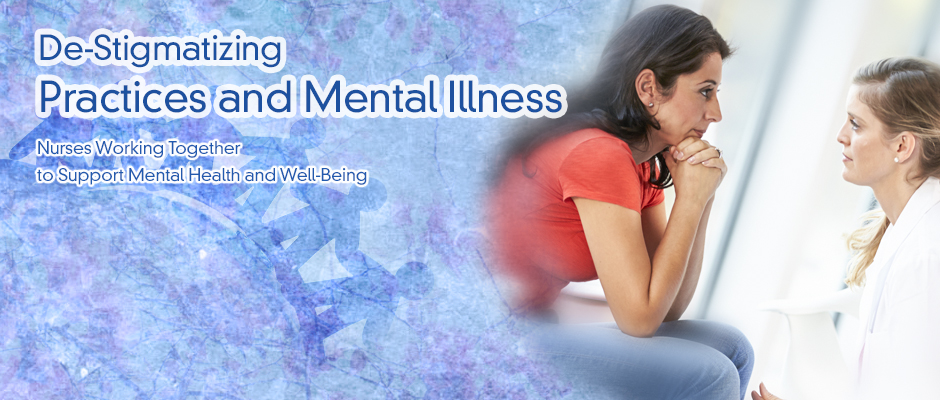Course Information
De-Stigmatizing Practices and Mental Illness: Nurses Working Together to Support Mental Health and Well-Being

As health care professionals we are responsible for the care and safety of our clients/patients, which also includes advocating on their behalf. It is not uncommon for patients with mental health challenges to report having experienced stigmatizing behaviours, from not only the general public but from health care providers as well. As a patient advocate, you have the unique opportunity to help address the stigma associated with mental illness.
By engaging in this program you have an opportunity to learn about mental illness from a patient’s perspective. You will be guided in a self-reflective process to examine your own beliefs and behaviours while engaging with, learning and benefiting from the support of other health care providers. Examples of how you might respond to stigmatizing practices in the workplace also are provided to assist you as you move forward to help make a difference in the lives of those living with mental health challenges.
Please note: this module is NOT a pre-accredited MAINPRO M1 or MOC (Section 1) learning activity.
After completing this course you will be able to:
- Define stigma, how it is expressed as well as its consequences;
- Examine your attitudes, beliefs and behaviors toward persons with mental illness, i.e., engage in critical self-reflection;
- Describe stigma and discrimination and integrate strategies to address individual, structural and systemic stigma (e.g., stigma by association) and related challenges to the elimination of stigma and discrimination associated with mental illness, such as the associated myths (social discourses), marginalizing language such as “them” and “us” dichotomies and the media portrayal of persons living with a mental illness, to name a few;
- Describe and integrate strategies to address the social determinants of health and those factors that mitigate stigma and discrimination;
- Explain approaches to stigma and discrimination that reflect an understanding of the factors, including the social determinants of health, that may intersect with mental illness to influence/shape stigma and discrimination (and health and well-being) e.g., substance use, poverty, gender, age, [dis]ability, sexual orientation, religion, geography, to name several;
- Describe an increased level of comfort and interest in addressing mental illness and associated health problems as real [medical] illnesses that can be treated and managed and effectively combat the stigma of mental illness within one's practice and organization; and
- Explain the importance of the recovery model.
This project was funded by unrestricted educational grant
from the Mood Disorders Society of Canada, Mental Health Commission of Canada,
Bell Let's Talk, and the Canadian Nurses Association.
Course Registration
You must have an MDcme.ca account and be logged in to register for this course
Expiry Date
This course expires on
Wednesday, March 15, 2023
Primary Author:
- Victoria Smye RN, PhD
Planning Committee:
- Romie Christie
- Jo-Ann Nelson, MSc
- Katherine Gagnon
- Trina Gouthro, BScN, RN, MN
- Lisa Ashley, RN Med CCHN(C)
- Dave Gallson
- Richard Chenier

